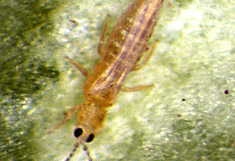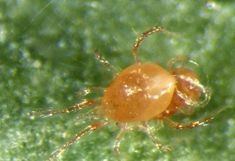Insect-plant-interactions ~ Climate change ~ Biological control ~ Agrobiodiversity ~ Use-of-potential & Risk analysis
Agricultural entomology
Agricultural entomology examines fundamental questions regarding the biology and ecology of problematic pests in agricultural and horticultural crops. Current projects include, among others, thrips with high damage potential in horticulture and field vegetable production, and the sugar beet weevil in arable crops.
The research focuses particularly on the relationships between insects and their host plants, as well as on chemical signals, e.g. essential oils and other biologically active plant compounds, which can mediate these relationships: Do plants emit specific odours that are particularly attractive to the pest species in question? Can plant compounds, applied to crops, produce repellent effects and keep pests from feeding or sucking? Do pests always behave differently on different host plants?
The aim of such studies is to build on basic findings about pest behavior to show practical perspectives of behavioral control in the context of innovative, sustainable and environmentally friendly crop protection concepts.
contact: Ao. Prof. DI Dr. Elisabeth Koschier (location Vienna)
Biological pest control
Behavioural, ecological and evolutionary aspects of pest arthropods and their natural enemies are the research topics of this group. Mites are used as model organisms to investigate predator-prey interactions among pest species (spider mites) and their natural enemies (predatory mites) at individual and population level.
Currently, we are dealing with the effects of extreme heat waves induced by climate warming on the biological control of the spider mite Tetranychus urticae by its predator Phytoseiulus persimilis. The preliminary lab-experiments at individual level may indicate that the predator is more heat-sensitive than its prey. The spider mite control may not be ensured under heat waves, when this trend is also confirmed in a tri-trophic system at population level.


